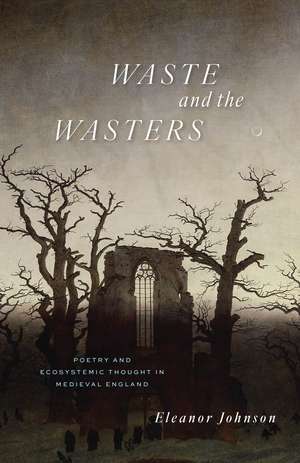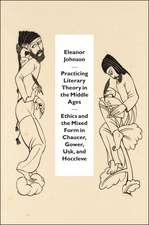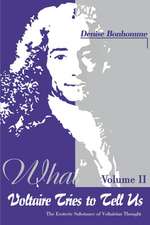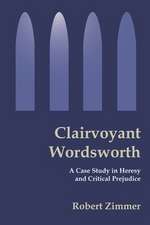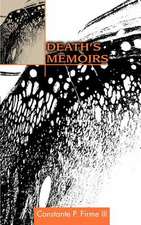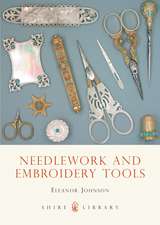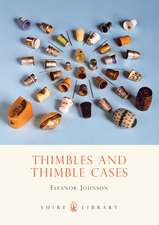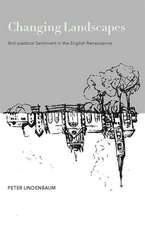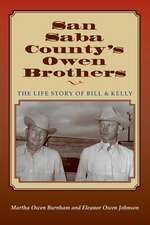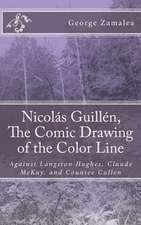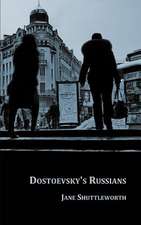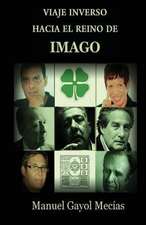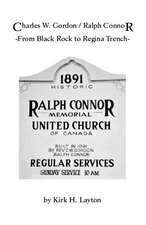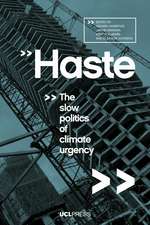Waste and the Wasters: Poetry and Ecosystemic Thought in Medieval England
Autor Eleanor Johnsonen Limba Engleză Paperback – 27 noi 2023
While the scale of today’s crisis is unprecedented, environmental catastrophe is nothing new. Waste and the Wasters studies the late Middle Ages, when a convergence of land contraction, soil depletion, climate change, pollution, and plague subsumed Western Europe. In a culture lacking formal scientific methods, the task of explaining and coming to grips with what was happening fell to medieval poets. The poems they wrote used the terms “waste” or “wasters” to anchor trenchant critiques of people’s unsustainable relationships with the world around them and with each other. In this book, Eleanor Johnson shows how poetry helped medieval people understand and navigate the ecosystemic crises—both material and spiritual—of their time.
| Toate formatele și edițiile | Preț | Express |
|---|---|---|
| Paperback (1) | 183.98 lei 3-5 săpt. | +11.34 lei 4-10 zile |
| University of Chicago Press – 27 noi 2023 | 183.98 lei 3-5 săpt. | +11.34 lei 4-10 zile |
| Hardback (1) | 577.64 lei 6-8 săpt. | |
| University of Chicago Press – 29 noi 2023 | 577.64 lei 6-8 săpt. |
Preț: 183.98 lei
Nou
Puncte Express: 276
Preț estimativ în valută:
35.21€ • 36.37$ • 29.30£
35.21€ • 36.37$ • 29.30£
Carte disponibilă
Livrare economică 04-18 martie
Livrare express 15-21 februarie pentru 21.33 lei
Preluare comenzi: 021 569.72.76
Specificații
ISBN-13: 9780226830179
ISBN-10: 0226830179
Pagini: 224
Dimensiuni: 140 x 216 x 20 mm
Greutate: 0.3 kg
Ediția:First Edition
Editura: University of Chicago Press
Colecția University of Chicago Press
ISBN-10: 0226830179
Pagini: 224
Dimensiuni: 140 x 216 x 20 mm
Greutate: 0.3 kg
Ediția:First Edition
Editura: University of Chicago Press
Colecția University of Chicago Press
Notă biografică
Eleanor Johnson is associate professor of English and comparative literature at Columbia University. She is the author of several books including, Staging Contemplation: Participatory Theology in Middle English Prose, Verse, and Drama, also published by the University of Chicago Press.
Cuprins
Introduction / Thinking and Talking Ecosystemically
Chapter One / The Five Disasters Facing Medieval Ecosystems
Chapter Two / The Laws of Waste: The Bible and the Common Law
Chapter Three / Waste in Sermons and Penitential Manuals: The Unjust Steward
Chapter Four / Winner and Waster: The Imperilment of the Land
Chapter Five / Wasters and Workers in Piers Plowman: Famine and Food Insecurity
Chapter Six / Chaucer’s Yeoman’s Wasting Body: Pollution and Contagion
Chapter Seven / The Wasted Lands of the Green Knight, and the Wasting of Camelot: Climate Change, Climate Revenge
Chapter Eight / Gardens, Bees, and Wastours: Political Waste and the Fantasy of Sustainability
Chapter Nine / Aftermath: From Wasting to Waste Matter
Epilogue
Acknowledgments
Notes
Index
Chapter One / The Five Disasters Facing Medieval Ecosystems
Chapter Two / The Laws of Waste: The Bible and the Common Law
Chapter Three / Waste in Sermons and Penitential Manuals: The Unjust Steward
Chapter Four / Winner and Waster: The Imperilment of the Land
Chapter Five / Wasters and Workers in Piers Plowman: Famine and Food Insecurity
Chapter Six / Chaucer’s Yeoman’s Wasting Body: Pollution and Contagion
Chapter Seven / The Wasted Lands of the Green Knight, and the Wasting of Camelot: Climate Change, Climate Revenge
Chapter Eight / Gardens, Bees, and Wastours: Political Waste and the Fantasy of Sustainability
Chapter Nine / Aftermath: From Wasting to Waste Matter
Epilogue
Acknowledgments
Notes
Index
Recenzii
"A moving and powerful study of neglect and ecological damage as reflected in the literature of the Middle Ages."
"One of those rare academic books that remixes a collection of ideas—medieval poetry, land management, weather, bees, God’s vengeance, and climate change—in a style that’s eminently readable, bringing the past to life and connecting it to the present in one engaging sentence after another."
"Lively and accessible . . . [this] powerful study of 'waste' and 'wasting' shows how premodern thinkers used the category of waste to think about the human impact on ecological and social networks. . . . Johnson convincingly argues that premodern texts can help us think through how questions of value and belief might help us respond to our ecological, political, and moral waste and waste making in our own precarious times. . . . Waste and the Wasters is a book that has much to teach us about how the ideas we hold and the language we use to think through them can have real effects on the material world. "
"Johnson’s study of medieval legal and literary ideas of 'waste' and 'wasters' belongs on the reading list of every scholar and advanced student of the poems Winner and Waster, Piers Plowman, Chaucer’s Canon’s Yeoman’s Tale, and Sir Gawain and the Green Knight, as well as anyone concerned with modern ecological crises brought on by overly personalized and privatized views of waste 'products.' "
“Waste and the Wasters deftly maps the contours of ecosystemic imagination in medieval England through close engagement with one of its major vehicles: poetry. Johnson’s compelling study shows the importance of dealing with premodern sources in all their complexity as they work to make sense of the dense relational landscape that they inhabit and their responsibilities within it."
“Literary scholars in the Anthropocene can’t help but notice precarity, both precarity of time (there may not be much left!) and discursive precarity (does our discipline have much to offer?). Enter Eleanor Johnson. When we finish reading this vigorously conversational book, the ecosystem of our discipline will find refreshing new networks within which to work.”
“A beautiful and urgent essay on ecosystemic thought in late medieval England that is also a call to action on the climate catastrophe now unfolding. Look to art, says Johnson, when there’s no organized vocabulary for expressions of ecosystemic peril. Look to medieval poetry to find complex and ethical ruminations on what it is to waste and to be a waster, both critical communal problems tying individuals to larger concepts of social justice. In our current eco-meltdown, this book will emphatically not waste anyone’s time.”
